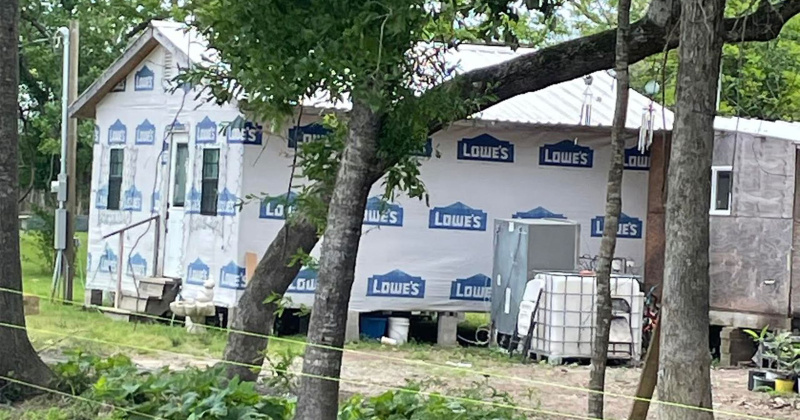Hardin County Judge Wayne McDaniel and the elected body of Commissioners Court have fielded proposed orders for residential building code standards for unincorporated areas at their April meetings but have failed to adopt processes that would deflect “another Colony Ridge” development like that under fire in Liberty County.
McDaniel said that County Attorney Matthew Minick confirmed that the proposed order would solve some of the issues with substandard dwellings, but it “wouldn’t be a 100% solution.”
McDaniel noted at the April 9 meeting of Commissioners Court that, for several months, he has been working with Minick, Pct. 3 Commissioner Amanda Young and Floodplain Administrator Alex Parker to find a solution to prevent substandard homes from being built in Hardin County.
“That is kind of how the problem in Liberty County started with the residents there (Colony Ridge) being illegal,” stated McDaniel. “We are just trying to prevent that problem from happening here.”
Colony Ridge, expanding exponentially since 2011, has been accused by the Department of Justice and the Consumer Financial Protection Bureau of using predatory lending practices to entice Hispanic immigrants to buy land in their developments using “bait-and-switch sales and predatory financing.” In March, the Texas Attorney General sued Colony Ridge and its owner, John Harris, for “having built a sprawling community on a foundation of false, misleading and deceptive sales, marketing and lending practices.”
McDaniel said Colony Ridge residents build houses out of wooden pallets and “use tarps, limbs and duct tape,” or someone else builds it for them.
“It’s deplorable living conditions for them,” McDaniel explained. “Neighbors complain because of the certain elements it brings. They have water and sewage not being properly deposed, and/or no electricity or running off a generator, in some cases.
“We have been trying to explore some way to prevent that from happening to keep people, who are illegally here, from moving into Hardin County. We’re not going to prevent 100% of that but we don’t want the problem Liberty County is facing where they have between 80,000 to 150,000 people over a small period of time moving in.”
He said the influx of people from the 33,000-acre development has affected schools and law enforcement agencies in Liberty County. McDaniel noted one option was for the court to adopt certain provisions of the Local Government Code for regulating housing and other structures that could be dangerous.
“It means we would essentially implement building codes just like a city has the ability to do that through city ordinances,” he stated. “That’s one way we can prevent this from happening.”
McDaniel said the public notice and draft order of the new proposed ordinance “created a firestorm,” but he was shocked at the responses.
“I thought we would get some blowback from developers,” he said. However, “I don’t think I got one single negative comment from any developer; they are in favor of us to do this.”
Those opposed to the proposed building standards were mainly created through misinformation put out to the public about taxes increasing and the county charging more money to build a home.
“We were not going up on inspection fees, we were just trying to stop the problem,” he explained. In a fact sheet published by McDaniel, the fees were $175 each for foundation and dry-in inspections, and $375 for a final inspection. He noted the fees are average and came from the Golden Triangle Inspectors Association. “People would hire their own inspectors that would cost them between $500 and $750 to have an inspection done.”
Pct. 2 Commissioner Chris Kirkendall stated the legislature needs to empower counties to regulate subdivisions and, at any phase, deny the developer to build in situations like Colony Ridge.
“If we don’t approve a subdivision plot, the developer can wait 30 days and it becomes a subdivision, regardless,” said Kirkendall of the current way things are done. “It takes away our citizens’ defense against things like this happening.”
McDaniel said it would be hard to enforce the proposed residential building code because wooden pallet structures can be constructed quickly and authorities “would have to catch them in the act.”
“If they refuse to stop,” McDaniel clarified, “we’d have to file a civil action in the 88th District Court and it may take some time to get any action by the judge. Then, there are some questions about if we can make them tear it down.”
McDaniel stated that the matter is likely dead, as is, but if it were to come up again, “we will provide notice and hold public hearings.”
Floodplain Administrator Alex Parker noted that non-residents can purchase land in Hardin County, but it must be an owner-finance deal. According to Parker, there is also a noted increase in squatters in the west and northwest parts of the county.
“We implemented new strategies against it last year,” said Parker. “They come in and want electricity on a property. We take a good look at the property on the Hardin County Appraisal District (CAD) records to see who owns it and, most of the time, it’s someone deceased.”
The applicant must have a stamped copy of the deed or a lease agreement signed by the property owner on CAD to receive access to utilities.
“We know they’re squatters because they’ll come in one time and we tell them that and we never see them again,” Parker explained.
As of September 2023, roughly 40,000 people resided in six different Colony Ridge Communities “with huge potential monthly growth,” the development shared.


